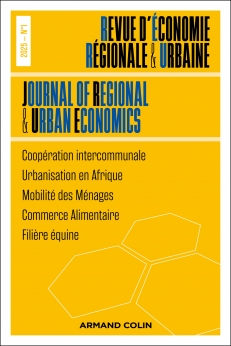
REVUE D'ÉCONOMIE RÉGIONALE ET URBAINE (1/2025)
Pour acheter ce numéro, contactez-nous
Recevez les numéros de l'année en cours et accédez à l'intégralité des articles en ligne.
Suite à l’échec de la loi Marcellin (1971), le législateur identifie dans le regroupement intercommunal un compromis à la fusion. Pendant plusieurs décennies, il incite (politiquement et économiquement) les élus locaux à se rassembler dans des groupements à fiscalité propre plus intégrés. Une nouvelle séquence institutionnelle s’ouvre toutefois à partir de 2010 avec l’objectif de simplifier le « mille-feuille territorial » et de « redimensionner la géographie des collectivités territoriales et de leurs établissements ». Sous l’effet de luttes que se livrent les représentants de l’Association des Maires de France et de l’Association des Communautés de France, le législateur se montre plus directif tout en essayant de ménager l’autonomie des élus locaux. Cet article souligne ainsi combien les subtilités et contradictions offertes par ces différentes lois permettent à ces derniers d’instrumentaliser ces institutions, au profit de leur capacité politique mais au détriment des objectifs de rationalisation affichés.
Following the failure of the Marcellin law (1971), the legislator identified in inter-municipal groupings as a compromise to merger. For several decades, he encouraged (politically and economically) local elected representatives to come together in more integrated groupings with their own tax status. However, a new institutional phase began in 2010, aiming to simplify the ‘territorial mille-feuille’ and ‘reshape the geography of local authorities and their establishments’. As a result of the battles waged by representatives of the Association of mayors of France and the Association of French communities, the legislator took a more directive stance (forcing the last remaining municipalities to join a public inter-municipal cooperation body), while respecting the freedom of local elected representatives and promoting the preservation of municipal interests. However, when the reform was implemented, this paradox led to a distortion between the stated objectives of the reform and the results achieved. Far from being a simple administrative and routine process, the implementation of a reform constitutes a profoundly political sequence, reopening the game to a local level and giving rise to new controversies, mobilisations, resistance and negotiations. To test the hypothesis that local elected officials exploit these flexibilities to adapt these new legislative rules to their advantage, thermal towns are an ideal object of study. Although they are well-equipped with services and have a greater political and financial capacity than their counterparts of the same size, the majority of them remains small, sparsely populated towns. Given this specificity, which limits their leadership in the local governance, the obligation to join an EPCI may be perceived more as a constraint than an opportunity. Therefore this article analyses the strategies used by local elected officials to circumvent the rule in order to enhance their town’s political capacity, to the detriment of the stated objectives of rationalisation.